Although many university courses in quackery have now closed, two subjects that hang on in a few places are western herbalism, and traditional Chinese medicine (including acupuncture). The University of Westminster still runs Chinese medicine, and Western herbal medicine (with dowsing). So do the University of Middlesex and University of East London.
Since the passing of the Health and Social Security Act, these people have been busy with their customary bait and switch tactics, trying to get taxpayers’ money. It’s worth looking again at the nonsense these people talk.
Take for example, the well known herbalist, Simon Mills. At one time he was associated with the University of Exeter, but no longer. Perhaps his views are too weird even for their Third Gap section (the folks who so misrepresented their results in a trial of acupuncture). Unsurprisingly, he was involved in the late Prince’s Foundation for Magic Medicine, and, unsurprisingly, he is involved with its successor, the "College of Medicine", where he spoke along similar lines. You can get a good idea about his views from the video of a talk that he gave at Schumacher College in 2005. It’s rather long, and exceedingly uncritical, so here’s a shorter version to which some helpful captions have been added.
That talk is weird by any standards. He says, apparently with a straight face, that "all modern medicines are cold in the third degree"..And with ginger and cinnamon "You can stop a cold, generally speaking, in its tracks" (at 21′ 30" in the video). This is simply not true, but he says it, despite the fact that the Plant Medicine with site (of which he’s a director) which he is associated gives them low ratings
Simon Mills is also a director of SustainCare. Their web site says
SustainCare Community Interest Company is a social enterprise set up to return health care to its owners: “learning to look after ourselves and our families in ways that make sense and do not cost the earth“. It is founded on the principle that one’s health is a personal story, and that illness is best managed when we make our health care our own. The enterprise brings clinical expertise, long experience of academia, education and business, and the connections and resources to deliver new approaches.
"As its own social enterprise contribution to this project Sustaincare set up and supported Café Sustain as a demonstration Intelligent Waiting Room at Culm Valley Integrated Centre for Health in Devon". (yes, that’s Michael Dixon, again]
In the talk (see video) Mills appears to want to take medicine back to how it was 1900 years ago, in the time of Galen. The oblique speaking style is fascinating. He never quite admits that he thinks all that nonsense is true, but presumably it is how he treats patients. Yet a person with these bizarre pre-scientific ideas is thought appropriate to advise the MHRA
It’s characteristic of herbalists that they have a very long list of conditions for which each herb is said to be good. The sort of things said by Mills differ little from the 1900-year old ideas of Galen, io the 17th century ideas of Culpepper.
You can see some of the latter in my oldest book, Blagrave’s supplement to Culpepper’s famous herbal, published in 1674.
See what he has to say about daffodils
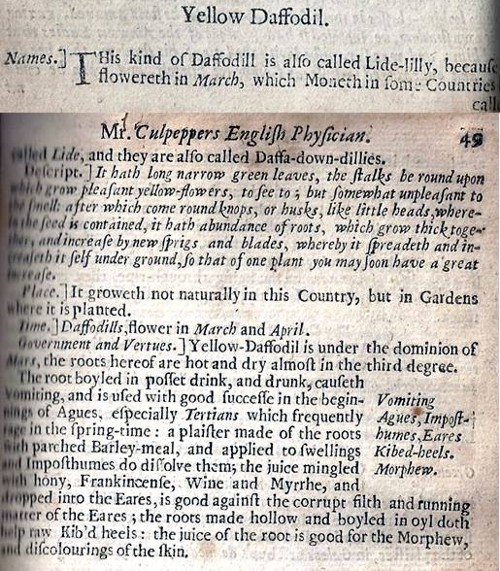
It is "under the dominion of Mars, and the roots hereof are hot and dry almost in the third degree".
"The root, boyled in posset drink, and drunk, causeth vomiting, and is used with good successe in the beginning of Agues, especiallyTertians, which frequently rage in the spring-time: a plaister made of the roots with parched Barley meal, and applied to swellings and imposthumes do dissolve them; the juice mingled with hony, frankincense, wine and myrrhe, and dropped into the Eares, is good against the corrupt filth and running matter of the Eares; the roots made hollow and boyled in oyl doth help Kib’d heels [or here]: the juice of the root is good for Morphew, and discolourings of the skin."
It seems that daffodils would do a lot in 1674. Even herbalists don’t seem to use it much now. A recent herbal site describes daffodil as "poisonous".
But the descriptions are very like those used by present day herbalists, as you can hear in Simon Mills’ talk.
Chinese medicine is even less tested than western herbs. Not a single Chinese herb has been shown to be useful for treating anything (though in a very few case, they have been found to contain drugs that are useful when purified, notably the anti-malarial compound, artemesinin). They are often contaminated, some are dangerously toxic. And they contribute to the extinction of tigers and rhinoceros because of the silly myths that these make useful medicines. The cruelty of bear bile farming is legendary.
In a recent report in China Daily (my emphasis).
In a congratulation letter, Vice-Premier Li Keqiang called for integration of TCM and Western medicine.
TCM, as a time-honored treasure of Chinese civilization, has contributed to the prosperity of China and brought impacts to world civilization, Li said.
He also urged medical workers to combine the merits of TCM with contemporary medicine to better facilitate the ongoing healthcare reform in China.
The trade in Chinese medicines survives only for two reasons. One is that thay are a useful tool for promoting Chinese nationalism. The other is that they are big business. Both are evident in the vice-premier’s statement.
I presume that it’s the business bit that is the reason why London South Bank University (ranked 114 ou ot 114) that led to one of their main lecture theatres being decorated with pictures like this.“Mr Li Changchun awarding 2010 Confucius Institute of the year to LSBU Vice Chancellor” . I’ll bet Mr Li Changchun uses real medicine himself, as most Chinese who can afford it do.
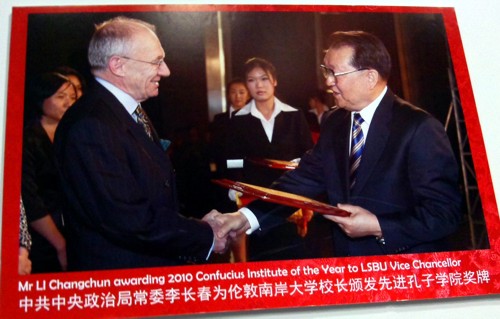
Presumably, what’s taught in their Confucius Institute is the same sort of dangerous make-believe nonsense.that’s taught on other such courses.
The "College of Medicine" run a classical bait and switch operation. Their "First Thursday lectures" have several good respectable speakers, but then they have Andrew Flower, He is "a former president of the Register of Chinese Herbal Medicine, a medical herbalist and acupuncturist. He has recently completed a PhD exploring the role of Chinese herbal medicine in the treatment of endometriosis". He’s associated with the Avicenna Centre for Chinese Medicine, and with the University of Southampton’s quack division The only bit of research I could find by Andrew Flower was a Cochrane review, Chinese herbal medicine for endometriosis. The main results tell us
"Two Chinese RCTs involving 158 women were included in this review. Both these trials described adequate methodology. Neither trial compared CHM with placebo treatment."
But the plain language summary says
"This review suggests that Chinese herbal medicine (CHM) may be useful in relieving endometriosis-related pain with fewer side effects than experienced with conventional treatment."
It sounds to me as though people as partisan as the authors of this should not be allowed to write Cochrane reviews.
Flower’s talk is followed by one from the notorious representative of the herbal industry, Michael McIntyre, talking on Herbal medicine: A major resource for the 21st century. That’s likely to be about as objective as if they’d invited a GSK drug rep to talk about SSRIs.
The people at Kings College London Institute of Pharmaceutical Sciences are most certainly not quacks. They have made a database of chemicals found in traditional Chinese medicine. It’s sold by a US company, Chem-TCM and it’s very expensive (Commercial license: $3,740.00. Academic/government license: $1,850.00). Not much open access there. It’s a good idea to look at chemicals of plant origin, but only as long as you don’t get sucked into the myths. It’s only too easy to fall for the bait and switch of quacks (like TCM salespeople). The sample page shows good chemical and botanical information, and predicted (not observed) pharmacological activity. More bizarrely, it shows also analysis of the actions claimed by TCM people.
![]()
It does seem odd to me to apply sophisticated classification methods to things that are mostly myth.
The multiple uses claimed for Chinese medicines are very like the make-believe claims made for western herbs by Galen, Culpepper and (with much less excuse) by Mills.
They are almost all untrue, but their proponents are good salesmen. Don’t let them get a foot in your door.
Follow-up
10 June 2012. No sooner did this post go public when I can across what must be one of the worst herbal scams ever: “Arthroplex“
31 July 2012. Coffee is the subject of another entry in the 1674 edition of Blagrave.
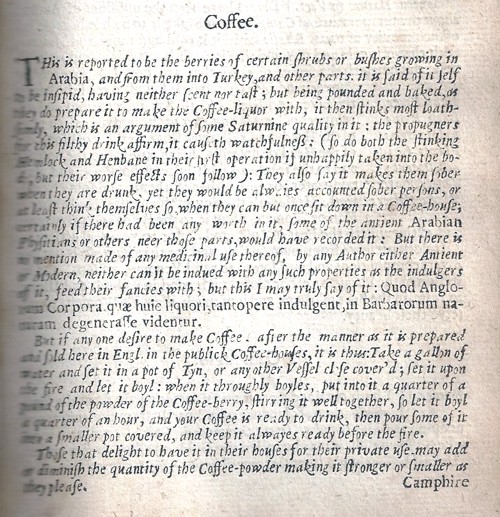
Blagrave evidently had a lower regard for coffee than I have.
“But being pounded and baked, as do it to make the Coffee-liquor with, it then stinks most loathsomly, which is an argument of some Saturnine quality in it.”
“But there is no mention of an medicinal use thereof, by any Author either Antient of Modern”
Blagrave says also
“But this I may truly say of it [coffee]: Quod Anglorum Corpora quae huic liquori, tantopere indulgent, in Barbarorum naturam degenerasse videntur,”
This was translated expertly by Benet Salway, of UCL’s History department
“that the bodies of the English that indulge in this liquor to such an extent seem to degenerate into the nature of barbarians”
My boss, Lucia Sivolotti got something very like that herself. Be very impressed.
Salway suggested that clearer Latin would have been “quod corpora Anglorum, qui tantopere indulgent huic liquori, degenerasse in naturam barbarorum videntur”.
I’d have passed that on to Blagrave, but I can’t find his email address.
I much prefer Alfréd Rényi’s aphorism (often misattributed to Paul Erdös)
“A mathematician is a machine for turning coffee into theorems”

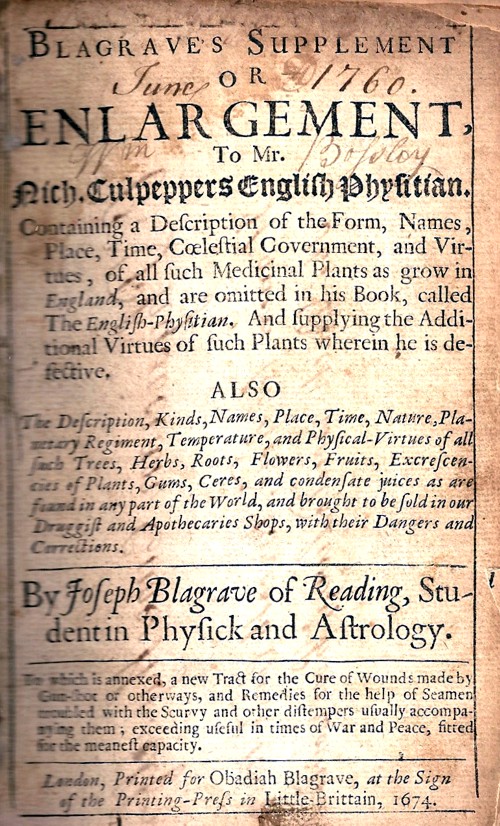
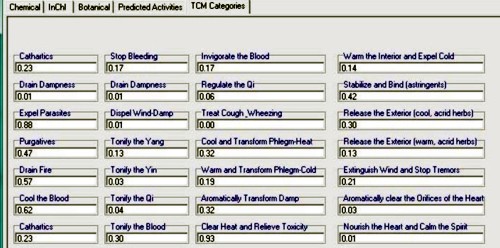

@eAcleron
One does wonder. It seems that talking nonsense with a straight face comes quite naturally to some people. They don’t even have to do the course.
Talking nonsense with a straight face is not so very difficult.
That is what I do when I perform as a magician. Specialising in Mentalism. That is – “demonstrating the effects of the paranormal, reading body language, non-verbal means of communication” etc. You get the drift.
So why not dust off that old Magic Set you got for Christmas a hundred years ago, select the Egg Vase, or Broken Wand, or trick pack of cards – and give it a go.
Remember, while you should get the trick right, it’s the performance and patter which really make it “work.”
Simple.
May the Wu be with you.
Professor Riccardo
Consultant Charlatan
Specialist in the Care of the Gullible
Or Consultant Orthopaedic Surgeon at other times.
Ha -but the difference is that you know it’s deception. Come to think of it, that must make it even harder to keep a straight face.
The scary thing about people like Mills is that they appear to really believe what they say.
One of the fascinating things about woo-mongers is trying to decide which ones really believe what they are saying, and which are just in it for the money. I’d guess most homeopaths are in the first category and most supplement salesman are in the latter.
“The oblique speaking style is fascinating.”
Indeed. He seems lost in a no-man’s land between using herbalists’ language as metaphors and using the terms as if they have real-world meaning and explanatory power.
I do find particularly nauseating the way he chooses to style himself as one who wears his great learning so lightly as he waves vaguely at phenol rings and calls them the “hot bit”.
@BadlyShavedMonkey
You can say that again. I’m intrigued also by the fact that the language varies according to the audience. At the “College of Medicine” conference there was much less of the “hot in the third degree” stuff:
e.g.
http://www.collegeofmedicine.org.uk/putting-herbal-medicines-practice
So, how do you, or anyone else, tell the difference between a practitioner of an alternative medicine system (as described by the House of Lords report) who honestly believes the system has intrinsic value, and practices with integrity on that basis – and a quack who knows it is nonsense, but seeks to take advantage of the gullible?
Are there any recognised tests? How do NHS employers tell the difference?
How do we know Mills genuinely believes what he says? Does he display delusion in other aspects of his life?
I’ve never heard of a test -can’t imagine how it would work. But from the point of view of patients, all that matters is whether the treatment works or not. So NHS needs only to judge treatments, not honesty.
Of course many of these people operate illegally, but Trading Standards fails consistently to enforce existing laws. That is no exaggeration: it was tested experimentally by Rose et al, 2012.
l think that genuine belief is not a good defence in law. Two homeopaths were jailed for manslaughter of their own daughter in Australia, despite being apparently genuine in their barmy beliefs.
If he thought those phenols were ‘hot’ I wonder how he explains why this…
http://upload.wikimedia.org/wikipedia/commons/1/17/Raspberry_ellagitannin.png
…isn’t incandescent
I was intrigued at Mr Mills suggestion that the “quick” of a nail bed (the hyponichium) was so called because observation of it gave a fast way to determine the “heat” of a patient.
Wrong (sigh).
“Quick” is derived from Old English ‘cwic’. Meaning “alive”.
Is by any chance Mr Mills related to Mrs Mills – I always found her very entertaining.
[…] an an addendum to a recent post on herbalists, Professor David Colquhoun remarked that this could be one of the worst herbal scams ever. His […]
[…] Wednesday 4th July, London South Bank University, never the most reputable institution in the Western hemisphere will further muddy its name by holding a conference on “Acupuncture […]
[…] Dr Gupta is not obviously sympathetic to woo. It’s hard to tell since he doesn’t seem to have published much. But one is not reassured by an article that he wrote for the Journal of Holistic Healthcare. It appears straight after an article by fantasy herbalist, Simon Mills. […]
[…] real medicine and pure quackery. Their 2012 conference had some very good speakers, but then it had a "herbal workshop" with Simon Mills (see a video) and David Peters (the man who tolerates dowsing as a way to diagnose which herb to […]
[…] will lead to an increase in the provision of myth-based therapies. That is part of the "bait and switch" tactic that quacks use in the hope of gaining respectability. A prime example is the […]
Dear Resolute hangers on of modern medicine,
Let me tell you that I have a research degree from the University of Plymouth (DPhil). I have multiple health conditions, all of which are currently under investigation by various parts of the NHS, but awaiting appointments. They do not do joined up thinking. The latest intervention has completely messed me up. I am stuck in bed in pain and fearful of taking any modern medication since my experience with side effects and withdrawal symptoms is now vast.
Just because knowledge is from the past does not mean it is rubbish. Surely History teaches us many lessons even if we choose to ignore them again and again. In fact that is as good an analogy as any. History gives us many of the lessons we need to improve ourselves and the world around us, but to date if you believe climate change, we are ignoring those lessons and modern research, to the peril of the human race.
So prise open your minds please, modern medicine does NOT have all the answers.
I have never heard anyone claim that “modern medicine” has all the answers. Quite on the contrary, it is blindingly obvious that it hasn’t. The only really big advances since the 1930s have been bacterial infections and in vaccines. Also in prosthetic surgery. Most of the rest has been marginal small improvements, and palliative rather than curative. Progress in some fields has been close to zero: low back pain, the common cold and almost anything to do with the CNS. And for many neurological conditions, the diagnosis is very crude indeed, as a result of the fact that we haven#t that foggiest idea about what causes them.
Of course none of this means that herbalists and other quacks have done any better. A few billion of US taxpayers’ dollars has been spent on testing all sorts of folk medicine. So far they haven’t come up with a single one that works, Try this https://nccih.nih.gov/health/herbsataglance.htm